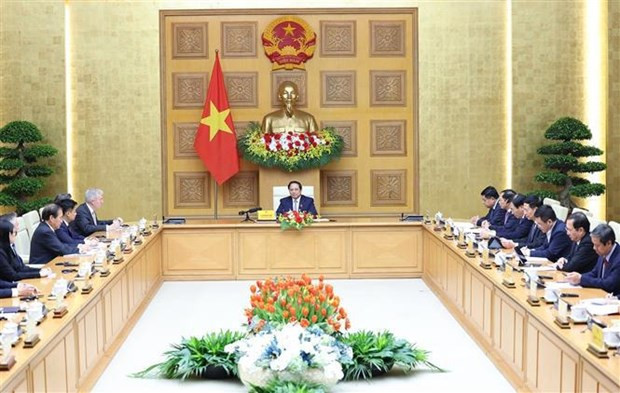Prime Minister Pham Minh Chinh described the Vietnam-US relationship as a model for post-war reconciliation, for the benefit of both countries and for peace, cooperation and development in the region and the world

Prime Minister Pham Minh Chinh hosted a reception in Ha Noi on March 21 for a high-ranking delegation from the US-ASEAN Business Council (USABC) led by the council's President and CEO Ted Osius, during which he stressed the instrumental role played by the USABC in the growing Vietnam-US economic ties.
PM Chinh described the Vietnam-US relationship as a model for post-war reconciliation, for the benefit of both countries and for peace, cooperation and development in the region and the world, as affirmed by US President Joe Biden.
He highlighted the importance of economic, trade, investment, science-technology, and innovation ties within the framework of the comprehensive strategic partnership established last year, saying that they are critical pillars to achieve the comprehensive, inclusive and more effective development of bilateral relations, as wished by both Party General Secretary Nguyen Phu Trong and President Biden.
Vietnam ensures the legitimate rights and interests of enterprises, he said, adding that the country commits to maintaining political stability, social safety and order, sovereignty and territorial integrity, along with stable policies, energy security and the ecology for green transition and digital transformation to create a pro-business environment for businesses' stable and sustainable growth.
Looking toward Vietnam's goal of becoming a developed nation with a modern industry and upper middle income by 2030, Chinh expressed his hope for the continued US support, particularly from US companies. He emphasised the need for joint efforts to address global challenges like climate change, population aging, pandemics and natural resource depletion.
Osius, for his part, thanked the Vietnamese Government for its support of foreign investors, including those from the US. He expressed their commitment to further investing in Vietnam in the fields of sci-tech, electronics, aviation, electric automobiles, logistics, energy, healthcare, finance, e-commerce, food and tourism.
The US firms proposed that Vietnam continue improving its legal framework, reforming administrative procedures, especially investment licensing, labour permits and visas. They also urged Vietnam to continue to provide tax incentives in priority sectors, promote circular and green economy, green transportation, carbon emissions reduction and energy transition, and develop infrastructure and logistics to enable their more effective operations in the country.
To effectively carry out the action plan for bilateral comprehensive strategic partnership, PM Chinh urged USABC to advocate for the early recognition of Vietnam's market economy status and its removal from US restrictions on hi-tech exports.
Underscoring the principle of "harmonious interests, shared risks”, he called on the US businesses to expand their presence in Vietnam and actively transfer technology, especially hi-tech solutions related to the digital economy, climate change response, green transition, and knowledge-based economies while renewing traditional driving forces such as consumption, export and investment.
He concluded by expressing his belief that the comprehensive strategic partnership between Vietnam and the US will be concretised through specific programmes, plans and projects, yielding tangible benefits for both nations.
TB (according to VNA)